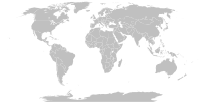| Overview | |
|---|---|
| Games of the XXIX Olympiad XIII Paralympic Games | |
 | |
| Winner: Beijing Runner-up: Toronto Shortlist: Paris · Istanbul · Osaka | |
| Details | |
| Committee | IOC |
| Election venue | Moscow 112th IOC Session |
| Map of the bidding cities | |
| Important dates | |
| First Bid | February 1, 2000 |
| Second bid | June 20, 2000 |
| Shortlist | August 28, 2000 |
| Decision | July 13, 2001 |
| Decision | |
| Winner | Beijing (56 votes) |
| Runner-up | Toronto (22 votes) |
Ten cities submitted bids to host the 2008 Summer Olympics and Paralympics that were recognized by the International Olympic Committee (IOC), five of which made the IOC Executive Committee's shortlist. The games were awarded to Beijing, China on July 13, 2001. The other shortlisted cities were Toronto, Paris, Istanbul and Osaka. Beijing won an absolute majority of votes after two rounds of voting, eliminating the need for subsequent rounds of voting. IOC delegates and the media identified a number of factors in its favor, including the size of the country, improvements in Chinese anti-doping enforcement, and its close loss to Sydney, Australia eight years earlier.[1] In that bidding process, which chose the host city for the 2000 Summer Olympics, Beijing led every round of voting but lost in the final round to Sydney by two votes.[2]
A number of politicians and non-governmental organizations criticized the Beijing bid and its selection due to concerns about China's human rights record. In response, supporters of the Beijing bid suggested that hosting the games might lead to "progress" on human rights and other issues. Some IOC delegates also expressed concerns about air pollution and heat in Beijing during the summer, and its effects on athletes participating in the games. In order to address such concerns, the Beijing bid included plans to reduce both air and water pollution in the city in advance of the games.[1]
- ^ a b Longman, Jere (2001-07-14). "OLYMPICS; Beijing Wins Bid for 2008 Olympic Games". The New York Times. Retrieved 2009-06-11.
- ^ Riding, Alan (1993-09-24). "Olympics; 2000 Olympics Go to Sydney In Surprise Setback for China". The New York Times. Retrieved 2009-06-05.
